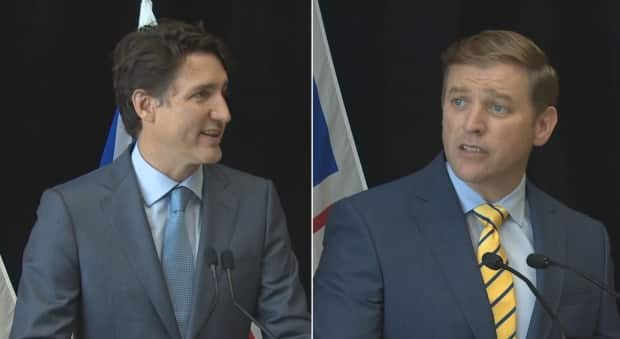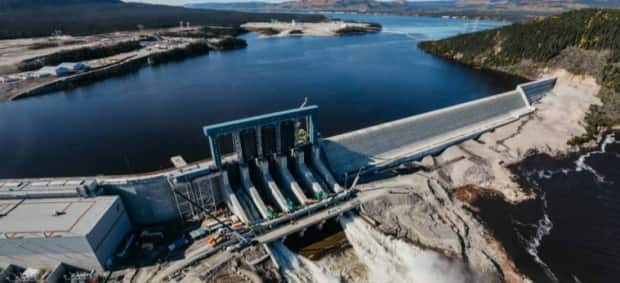$5.2B deal reached between feds, N.L. government to stave off skyrocketing power bills

The federal and provincial governments have struck a $5.2-billion deal to stave off the starkest financial consequences of the Muskrat Falls hydroelectric project in Newfoundland and Labrador, an agreement that includes keeping electricity bills on the island from spiking in a few months.
Prime Minister Justin Trudeau and Premier Andrew Furey made a short joint announcement before media at Confederation Building in St. John's on Wednesday to say an agreement had been reached but provided few details at the time.
Trudeau said the deal would "ensure financial sustainability of the project, while protecting people from major electricity increases." Sharp hikes to electricity bills for the island portion of the province, as a consequence of the overbudget and behind-schedule Muskrat Falls project, have loomed over the province for years.
The deal, fleshed out in a technical briefing after the announcement, involves a combination of new money and refinancing arrangements, and promises to reduce the province's cost of financing its Muskrat Falls debt.
Without such a deal, once Muskrat Falls is commissioned in the fall and power begins to fully flow to the grid, electricity ratepayers in Newfoundland and Labrador would be on the hook to pay for it. That would cause power rates to balloon for customers on the island, from 13 cents per kilowatt-hour to just under 23 cents.
Under the new deal, rates will still rise to 14.7 cents, about a 10 per cent increase.
Government officials anticipate further rate increases of about 2.25 per cent a year.

Under the terms of the deal, Ottawa agrees to give annual cash transfers to Newfoundland and Labrador equal to what it makes from interest in the Hibernia offshore oil project. The federal government pegged that portion of the deal as worth $3.2 billion between now and the end of Hibernia's lifespan.
The agreement also includes $2 billion in federal financing, half of which comes in the form of a federal loan guarantee. The other $1 billion is billed as an investment in Newfoundland and Labrador's portion of the Labrador-Island Link, the transmission system that carries Muskrat Falls' power from central Labrador and distributes it across the island.
The federal government won't buy those transmission assets outright, with the money acting as a loan that must be repaid in 2042.
The entire deal is not set in stone; as an agreement-in-principle, it needs to be officially commissioned — which government officials expect to happen in September — and have Parliament approve the Hibernia royalty change. Officials expect the deal to finalized by the end of 2021.
"Muskrat Falls has been the No. 1 issue facing Newfoundlanders and Labradorians now, for well over a decade," Furey said at Wednesday's announcement.
He said the deal "will finally get the muskrat off our back." Neither leader took questions from the media at the announcement, with Trudeau saying those would have to wait until another announcement later Wednesday afternoon.
The final cost for Muskrat Falls is expected to land at around $13 billion, a far cry from its initial $6.2-billion price tag in 2010.
As costs have soared, efforts to mitigate the taxpayer burden to pay for the project have occupied significant political time at the provincial and federal levels. Ottawa has increased its loan guarantees in the past, and at the end of 2020, deferred $844 million in provincial payments and appointed energy expert Serge Dupont as lead negotiator on the file.
The project was billed as a clean energy project to supply Newfoundland and Labrador, Nova Scotia and potentially beyond, but it has been dogged by complications since its inception.
It has been subject to a provincial inquiry that produced a scathing report about its management, and the Crown corporation created to oversee the project, Nalcor Energy, is in the midst of being dismantled as a cost-saving measure.
Innu Nation concerns
Wednesday's deal announcement was marked by a small protest outside of the legislature, as a handful of people stood voicing their opposition to any further hydroelectric development in Labrador.
Ahead of Wednesday's press conference, the Innu Nation outlined its concerns about Trudeau's visit to St. John's.
The Innu Nation agreed to the Muskrat Falls project at its inception, but Etienne Rich, grand chief of Innu Nation, told CBC News Wednesday's announcement was a "backroom deal," and Innu Nation was not consulted.
Rich said he met with Furey on June 9 and asked about rate mitigation. He said Furey didn't have any answers but committed to informing Innu Nation ahead of time when it came to making a deal.
"We found out through the media, and no one from the premier's office had contacted us to give us a heads up about what the upcoming announcement is," Rich said.
"The last meeting we had with him, and every word he is saying, he doesn't keep whatever he said. He's a very dishonest person. That's how I find him right now. It's very frustrating and I'm very disappointed because we're supposed to be the first people to know what's being talked about."

In 2008 Innu Nation made an agreement with Nalcor where it would receive a percentage of profits when the project begins to make money.
In a media release Innu Nation said the benefits it was promised cannot be sacrificed.
Rich said he doesn't know how much money Innu Nation could make because it hasn't been given any details about Wednesday's deal.
A land claims agreement between the Innu Nation and the federal and provincial governments is not yet finalized, and as federal election speculation ramps up, the nation said it wants a treaty resolution to become an election issue.
Such a treaty would include a right for Innu consent on future hydroelectric projects in Labrador, the media release said, a departure from the past Churchill Falls project which destroyed the traditional nomadic Innu way of life in the 1960s.
"Our land is not a commodity to be sold to solve N.L.'s economic crisis," the Innu Nation media release reads.
Rich said Wednesday's announcement has an effect on reconciliation talks with the province and Canada.
Meanwhile, when asked about Innu Nation's frustrations, Furey said, "I'm sure they will be more happy as more details become available to them."

